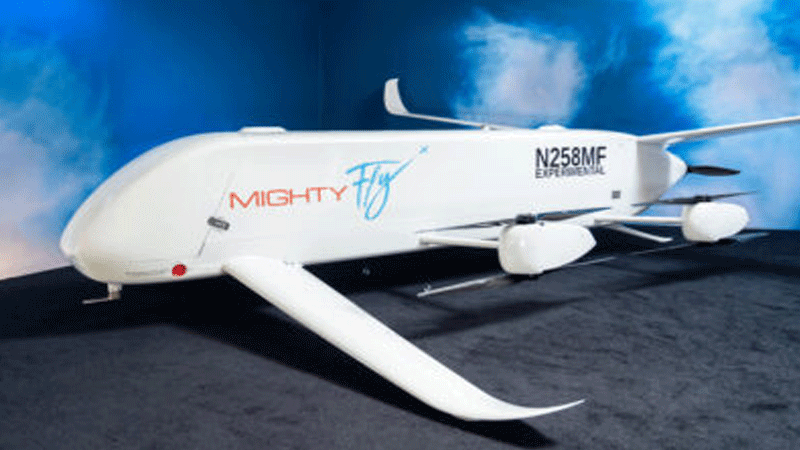MightyFly unveiled the third generation of the Cento aircraft, an autonomous hybrid eVTOL cargo aircraft designed to carry one hundred pounds of cargo for six hundred miles.
The new eVTOL incorporates several novel features, including a sleek design that enables operational efficiency, the ability to accommodate a wide range of payload center of gravity, autonomous center of gravity determination, and a larger cargo bay.
At the event, MightyFly revealed several technical characteristics of its 2024 Cento, including:
- a tandem wing design to enable a large trim of the aircraft center of lift;
- the use of structural conductors to increase reliability and reduce weight;
- a composite structure to reduce empty weight and increase payload capacity;
- a modular design to optimize maintenance;
- the use of the canard as landing gear to lower drag and drive efficiency.
The new eVTOL will also present improved operational efficiency through MightyFly’s Autonomous Load Mastering System (ALMS) component, which will enable the aircraft to autonomously open and close its cargo bay door, receive and eject packages into and from the cargo bay opening, move and secure packages in the cargo bay via an internal positioning and locking system, and sense and compute weight and balance.
All of these tasks will be done autonomously, without requiring an operator to reposition the packages inside the aircraft, which will help minimize the ground operation resources required to run and operate the MightyFly autonomous aircraft. MightyFly is currently working with Agility Prime and Air Mobility Command in the development of the ALMS feature to solve the U.S. Air Force’s most pressing autonomous aerial logistics needs.
Additionally, MightyFly’s third generation aircraft has been designed to accommodate a relatively large range of payloads’ center of gravity, which allows for a high degree of variance in cargo contents, densities, constitutions, loading order, and tie-down positions. This design attribute is expected to be a key technology differentiator for the Cento platform and its utility to be extremely valuable and competitive in the market.
The aircraft’s cargo bay is significantly larger than its second generation predecessor, the size of which was set based on extensive market research to optimize the number of packages for the 100 pounds payload capability. This enlarged cargo bay will allow the delivery of larger packages and goods, including the traditional cooler boxes used to transport donor organs for transplantation and blood bags. It will also benefit additional use cases and businesses in the industries of logistics, manufacturing, healthcare, pharmaceutical, retail, automotive, and oil and gas, as well as organizations performing humanitarian and disaster relief work, and government’s defense teams executing various logistics and resupply missions.
The unveiling event, hosted at MightyFly’s headquarters in San Leandro, CA, also featured a few stationary demonstrations of the aircraft’s capabilities to a crowd of partners, investors, potential customers, and government representatives.
“We are very excited to show everyone the tremendous work and ingenuity performed by the MightyFly team throughout the last year, and to unveil the 2024 Cento that couples innovation with efficiency in design, maintenance, and operation, bringing to the world the key to transform the expedited logistics market,” said Manal Habib, co-founder and CEO of MightyFly. MightyFly’s new eVTOL will revolutionize industries such as manufacturing, retail, and healthcare, and will transform life in rural and remote areas. “All of us at MightyFly are extremely excited to be working at the forefront of a new era of automation and innovation.”
The event also included a presentation by one of MightyFly’s investors, Tim Draper, Founding Partner of Draper Associates, who spoke about the tremendous potential of the 2024 Cento and autonomous eVTOLs to transform expedited logistics.
“How exciting to see the 2024 Cento come to life! A few months ago I saw the team working on its design and starting to manufacture its first parts. The vehicle you see today is a testimony of MightyFly’s talent, creativity, innovation, and decades of industry expertise. This technology will help save lives and solve painful logistics needs of businesses around the globe,” said Draper.
MightyFly concluded production of its third generation aircraft in early January 2024 and will begin its aircraft qualification tests, which include a test plan previously followed for its predecessor aircraft, in February.
In the fall of 2024, MightyFly will publicly debut its autonomous cargo aircraft delivery flights in Michigan, demonstrating point-to-point autonomous delivery use cases to partners and potential customers.
The company is also scheduled to demonstrate its autonomous loading, unloading, and balancing of packages capability to the U.S. Air Force in early 2025 and to perform additional Proof of Concept (POC) programs.









